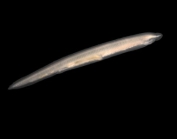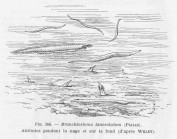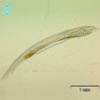WoRMS taxon details
Branchiostoma lanceolatum (Pallas, 1774)
104906 (urn:lsid:marinespecies.org:taxname:104906)
accepted
Species
Amphioxus lanceolatus (Pallas, 1774) · unaccepted (synonym)
Branchiostoma haecklii Franz, 1922 · unaccepted
Branchiostoma lubricum Costa, 1834 · unaccepted
Limax lanceolatus Pallas, 1774 · unaccepted
- Subspecies Branchiostoma lanceolatum belcheri Tattersall, 1903 accepted as Branchiostoma belcheri (Gray, 1847) (junior synonym)
marine
(of Limax lanceolatus Pallas, 1774) Pallas, P. S. (1774). Spicilegia zoologica, quibus novae imprimis et obscurae animalium species iconibus, descriptionibus atque commentariis illustrantur cura P.S. Pallas. <em>[Book series, 14 volumes].</em> Fasciculus 10, pp. 1–41, 4 plates., available online at https://biodiversitylibrary.org/page/27823183 [details]
Description The lancelet Branchiostoma lanceolatum is considered an invertebrate although the species bears quite some resemblance with...
Distribution In the 1976-1986 period Branchiostoma lanceolatum was widely spread outside the near-coastal zone and reached densities of...
Description The lancelet Branchiostoma lanceolatum is considered an invertebrate although the species bears quite some resemblance with ‘primitive fish’. It is possible to distinguish a head with a mouth surrounded by fine tentacles (used to gather food), a ‘body and a ‘tail’. The animal is covered with fins and manages to cover small distances by swimming; however, the lancelet is buried in coarse sediment most of the time. [details]
Distribution In the 1976-1986 period Branchiostoma lanceolatum was widely spread outside the near-coastal zone and reached densities of...
Distribution In the 1976-1986 period Branchiostoma lanceolatum was widely spread outside the near-coastal zone and reached densities of 600 ind./m2 maximally in that area. In the 1994-2001 period the distribution of the species was remarkably more limited and lower densities were observed: B. lanceolatum was exclusively found near the Hinder Banks in densities of maximum 120 ind./m2. [details]
WoRMS (2024). Branchiostoma lanceolatum (Pallas, 1774). Accessed at: https://www.marinespecies.org/aphia.php?p=taxdetails&id=104906 on 2024-12-17
Date
action
by
![]() The webpage text is licensed under a Creative Commons Attribution 4.0 License
The webpage text is licensed under a Creative Commons Attribution 4.0 License
original description
(of Branchiostoma lubricum Costa, 1834) Costa, O. G. (1834). Cenni zoologici, ossia Descrizione sommaria delle specie nuove di animali discoperti in diverse contrade del regno nell'anno 1834, etc. , available online at https://books.google.be/books?hl=pt-PT&lr=&id=zfNhAAAAcAAJ&oi=fnd&pg=PR2&dq=Cenni+Zoologici&ots=g_6YJSBBs8&sig=TN2qPK-RVkIbS70A8Xb5wG3CscI&redir_esc=y#v=onepage&q=Cenni%20Zoologici&f=false
page(s): 49 [details]
original description (of Limax lanceolatus Pallas, 1774) Pallas, P. S. (1774). Spicilegia zoologica, quibus novae imprimis et obscurae animalium species iconibus, descriptionibus atque commentariis illustrantur cura P.S. Pallas. <em>[Book series, 14 volumes].</em> Fasciculus 10, pp. 1–41, 4 plates., available online at https://biodiversitylibrary.org/page/27823183 [details]
context source (BeRMS 2020) Bio-environmental research group; Institute of Agricultural and Fisheries research (ILVO), Belgium; (2015): Zooplankton monitoring in the Belgian Part of the North Sea between 2009 and 2010. [details]
basis of record van der Land, J. (2001). Cephalochordata, <B><I>in</I></B>: Costello, M.J. <i>et al.</i> (Ed.) (2001). <i>European register of marine species: a check-list of the marine species in Europe and a bibliography of guides to their identification. Collection Patrimoines Naturels,</i> 50: pp. 357 (look up in IMIS) [details]
additional source Poss, S. G.; Boschung, H. T. (1996). Lancelets (Cephalochordata: Branchiostomatidae): How many species are valid?. <em>Isr. J. Zool.</em> 42 (Suppl): S13-S66. [details]
additional source Muller, Y. (2004). Faune et flore du littoral du Nord, du Pas-de-Calais et de la Belgique: inventaire. [Coastal fauna and flora of the Nord, Pas-de-Calais and Belgium: inventory]. <em>Commission Régionale de Biologie Région Nord Pas-de-Calais: France.</em> 307 pp., available online at http://www.vliz.be/imisdocs/publications/145561.pdf [details]
additional source Hayward, P.J. & J.S. Ryland (Eds.). (1990). The marine fauna of the British Isles and North-West Europe: 1. Introduction and protozoans to arthropods. <em>Clarendon Press: Oxford, UK.</em> 627 pp. (look up in IMIS) [details] Available for editors [request]
[request]
additional source van der Land, J. (ed). (2008). UNESCO-IOC Register of Marine Organisms (URMO). , available online at http://www.marinespecies.org/urmo/ [details]
page(s): 49 [details]
original description (of Limax lanceolatus Pallas, 1774) Pallas, P. S. (1774). Spicilegia zoologica, quibus novae imprimis et obscurae animalium species iconibus, descriptionibus atque commentariis illustrantur cura P.S. Pallas. <em>[Book series, 14 volumes].</em> Fasciculus 10, pp. 1–41, 4 plates., available online at https://biodiversitylibrary.org/page/27823183 [details]
context source (BeRMS 2020) Bio-environmental research group; Institute of Agricultural and Fisheries research (ILVO), Belgium; (2015): Zooplankton monitoring in the Belgian Part of the North Sea between 2009 and 2010. [details]
basis of record van der Land, J. (2001). Cephalochordata, <B><I>in</I></B>: Costello, M.J. <i>et al.</i> (Ed.) (2001). <i>European register of marine species: a check-list of the marine species in Europe and a bibliography of guides to their identification. Collection Patrimoines Naturels,</i> 50: pp. 357 (look up in IMIS) [details]
additional source Poss, S. G.; Boschung, H. T. (1996). Lancelets (Cephalochordata: Branchiostomatidae): How many species are valid?. <em>Isr. J. Zool.</em> 42 (Suppl): S13-S66. [details]
additional source Muller, Y. (2004). Faune et flore du littoral du Nord, du Pas-de-Calais et de la Belgique: inventaire. [Coastal fauna and flora of the Nord, Pas-de-Calais and Belgium: inventory]. <em>Commission Régionale de Biologie Région Nord Pas-de-Calais: France.</em> 307 pp., available online at http://www.vliz.be/imisdocs/publications/145561.pdf [details]
additional source Hayward, P.J. & J.S. Ryland (Eds.). (1990). The marine fauna of the British Isles and North-West Europe: 1. Introduction and protozoans to arthropods. <em>Clarendon Press: Oxford, UK.</em> 627 pp. (look up in IMIS) [details] Available for editors
additional source van der Land, J. (ed). (2008). UNESCO-IOC Register of Marine Organisms (URMO). , available online at http://www.marinespecies.org/urmo/ [details]
 Present
Present  Present in aphia/obis/gbif/idigbio
Present in aphia/obis/gbif/idigbio  Inaccurate
Inaccurate  Introduced: alien
Introduced: alien  Containing type locality
Containing type locality
Unreviewed
Description The lancelet Branchiostoma lanceolatum is considered an invertebrate although the species bears quite some resemblance with ‘primitive fish’. It is possible to distinguish a head with a mouth surrounded by fine tentacles (used to gather food), a ‘body and a ‘tail’. The animal is covered with fins and manages to cover small distances by swimming; however, the lancelet is buried in coarse sediment most of the time. [details]Distribution In the 1976-1986 period Branchiostoma lanceolatum was widely spread outside the near-coastal zone and reached densities of 600 ind./m2 maximally in that area. In the 1994-2001 period the distribution of the species was remarkably more limited and lower densities were observed: B. lanceolatum was exclusively found near the Hinder Banks in densities of maximum 120 ind./m2. [details]
Habitat Branchiostoma lanceolatum clearly prefers coarse sediments: the relative occurrence in sediments with a median grain size of 600-650 μm amounts to 20%. The mud content of the sediment is always less than 10%. [details]
| Language | Name | |
|---|---|---|
| Danish | lancetfisk | [details] |
| Dutch | lancetvisje | [details] |
| English | lancelet | [details] |
| French | lanceletamphioxus | [details] |
| German | LanzettierchenLanzettfischchen | [details] |
| Norwegian Bokmål | lansettfisk | [details] |
| Norwegian Nynorsk | lansettfisk | [details] |
| Swedish | lansettfisk | [details] |
Marine Life Information Network - UK
PlanktonNet Image
To Barcode of Life (18 barcodes)
To Biodiversity Heritage Library (110 publications) (from synonym Branchiostoma lubricum Costa, 1834)
To Biodiversity Heritage Library (205 publications)
To Biodiversity Heritage Library (669 publications) (from synonym Amphioxus lanceolatus (Pallas, 1774))
To Biodiversity Heritage Library (98 publications) (from synonym Limax lanceolatus Pallas, 1774)
To European Nucleotide Archive, ENA (Branchiostoma lanceolatum)
To GenBank (70897 nucleotides; 40012 proteins)
To PESI (from synonym Amphioxus lanceolatus (Pallas, 1774))
To PESI
To Yale Peabody Museum of Natural History (YPM IZ 093891)
To ITIS
PlanktonNet Image
To Barcode of Life (18 barcodes)
To Biodiversity Heritage Library (110 publications) (from synonym Branchiostoma lubricum Costa, 1834)
To Biodiversity Heritage Library (205 publications)
To Biodiversity Heritage Library (669 publications) (from synonym Amphioxus lanceolatus (Pallas, 1774))
To Biodiversity Heritage Library (98 publications) (from synonym Limax lanceolatus Pallas, 1774)
To European Nucleotide Archive, ENA (Branchiostoma lanceolatum)
To GenBank (70897 nucleotides; 40012 proteins)
To PESI (from synonym Amphioxus lanceolatus (Pallas, 1774))
To PESI
To Yale Peabody Museum of Natural History (YPM IZ 093891)
To ITIS






